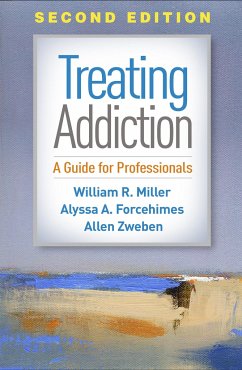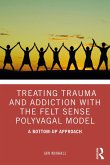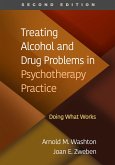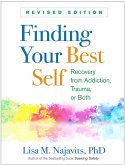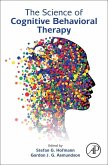William R. Miller (University of New Mexico (Emeritus) United Stat, Alyssa A. Forcehimes, Allen Zweben (United Sta Columbia University School of Social Work
Treating Addiction, Second Edition
A Guide for Professionals
William R. Miller (University of New Mexico (Emeritus) United Stat, Alyssa A. Forcehimes, Allen Zweben (United Sta Columbia University School of Social Work
Treating Addiction, Second Edition
A Guide for Professionals
- Gebundenes Buch
- Merkliste
- Auf die Merkliste
- Bewerten Bewerten
- Teilen
- Produkt teilen
- Produkterinnerung
- Produkterinnerung
This widely respected text and practitioner guide, now revised and expanded, provides a roadmap for effective clinical practice with clients with substance use disorders.
Andere Kunden interessierten sich auch für
![Treating Trauma and Addiction with the Felt Sense Polyvagal Model Treating Trauma and Addiction with the Felt Sense Polyvagal Model]() Jan WinhallTreating Trauma and Addiction with the Felt Sense Polyvagal Model52,99 €
Jan WinhallTreating Trauma and Addiction with the Felt Sense Polyvagal Model52,99 €![Treating Alcohol and Drug Problems in Psychotherapy Practice, Second Edition Treating Alcohol and Drug Problems in Psychotherapy Practice, Second Edition]() Arnold M. WashtonTreating Alcohol and Drug Problems in Psychotherapy Practice, Second Edition52,99 €
Arnold M. WashtonTreating Alcohol and Drug Problems in Psychotherapy Practice, Second Edition52,99 €![Correctional Counseling and Rehabilitation Correctional Counseling and Rehabilitation]() Emily J. Salisbury (University of Utah)Correctional Counseling and Rehabilitation90,99 €
Emily J. Salisbury (University of Utah)Correctional Counseling and Rehabilitation90,99 €![Finding Your Best Self, Revised Edition Finding Your Best Self, Revised Edition]() Lisa M. Najavits (MAFinding Your Best Self, Revised Edition24,99 €
Lisa M. Najavits (MAFinding Your Best Self, Revised Edition24,99 €![Addiction, Accommodation, and Vulnerability in Psychoanalysis Addiction, Accommodation, and Vulnerability in Psychoanalysis]() Darren HaberAddiction, Accommodation, and Vulnerability in Psychoanalysis172,99 €
Darren HaberAddiction, Accommodation, and Vulnerability in Psychoanalysis172,99 €![The Science of Cognitive Behavioral Therapy The Science of Cognitive Behavioral Therapy]() The Science of Cognitive Behavioral Therapy82,99 €
The Science of Cognitive Behavioral Therapy82,99 €![Handbook of Sleep Disorders in Medical Conditions Handbook of Sleep Disorders in Medical Conditions]() Handbook of Sleep Disorders in Medical Conditions161,99 €
Handbook of Sleep Disorders in Medical Conditions161,99 €-
-
-
This widely respected text and practitioner guide, now revised and expanded, provides a roadmap for effective clinical practice with clients with substance use disorders.
Hinweis: Dieser Artikel kann nur an eine deutsche Lieferadresse ausgeliefert werden.
Hinweis: Dieser Artikel kann nur an eine deutsche Lieferadresse ausgeliefert werden.
Produktdetails
- Produktdetails
- Verlag: Guilford Publications
- 2 ed
- Seitenzahl: 520
- Erscheinungstermin: 20. September 2019
- Englisch
- Abmessung: 356mm x 237mm x 36mm
- Gewicht: 832g
- ISBN-13: 9781462540440
- ISBN-10: 1462540449
- Artikelnr.: 54802398
- Herstellerkennzeichnung
- Libri GmbH
- Europaallee 1
- 36244 Bad Hersfeld
- 06621 890
- Verlag: Guilford Publications
- 2 ed
- Seitenzahl: 520
- Erscheinungstermin: 20. September 2019
- Englisch
- Abmessung: 356mm x 237mm x 36mm
- Gewicht: 832g
- ISBN-13: 9781462540440
- ISBN-10: 1462540449
- Artikelnr.: 54802398
- Herstellerkennzeichnung
- Libri GmbH
- Europaallee 1
- 36244 Bad Hersfeld
- 06621 890
William R. Miller, PhD, is Emeritus Distinguished Professor of Psychology and Psychiatry at the University of New Mexico. He introduced motivational interviewing in a 1983 article and in the first edition of Motivational Interviewing (1991), coauthored with Stephen Rollnick. Dr. Miller's research has focused particularly on the treatment and prevention of addictions and more broadly on the psychology of change. He is a recipient of two career achievement awards from the American Psychological Association, the international Jellinek Memorial Award, and an Innovators Award from the Robert Wood Johnson Foundation, among many other honors. His publications include 65 books and over 400 articles and chapters. His website is https://williamrmiller.net. Alyssa A. Forcehimes, PhD, is President of The Change Companies and Train for Change. Prior to joining these organizations, she was on the faculty of Psychiatry and Psychology at the University of New Mexico Health Sciences Center. Her research focuses on processes of motivation for change and on effective methods for disseminating and teaching evidence-based behavioral treatments in real-world settings. Dr. Forcehimes works in addiction, mental health, and health care settings to develop, implement, and evaluate behavior change practices. Allen Zweben, PhD, is Professor and Associate Dean at the Columbia University School of Social Work. His research and publications have focused primarily on innovative assessment and treatment approaches for substance use problems. Dr. Zweben has been a principal investigator on numerous behavioral and medication trials, including two landmark studies funded by the National Institute on Alcohol Abuse and Alcoholism: Project MATCH, a patient-treatment matching study, and the COMBINE study, a project examining the efficacy of combining pharmacotherapy and psychotherapy interventions for alcohol problems.
I. An Invitation to Addiction Treatment
1. Why Treat Addiction?
2. What Is Addiction?
3. How Do Drugs Work?
II. A Context for Addiction Treatment
4. Engaging
5. Screening, Evaluation, and Diagnosis
6. Withdrawal Management and Health Care Needs
7. Individualizing Treatment
8. Case Management
III. A Menu of Evidence-Based Options in Treating Addiction
9. Brief Interventions
10. Motivational Interviewing
11. Behavioral Coping Skills
12. Meditation and Mindfulness
13. Contingency Management
14. A Community Reinforcement Approach
15. Working with Significant Others
16. Strengthening Relationships
17. Mutual Help Groups
18. Medications in Treatment
IV. Professional Issues
19. Stuff That Comes Up
20. Treating Co-Occurring Conditions
21. Facilitating Maintenance
22. Working with Groups
23. Addressing the Spiritual Side
24. Professional Ethics
25. Implementing Evidence-Based Practice
References
Index
1. Why Treat Addiction?
2. What Is Addiction?
3. How Do Drugs Work?
II. A Context for Addiction Treatment
4. Engaging
5. Screening, Evaluation, and Diagnosis
6. Withdrawal Management and Health Care Needs
7. Individualizing Treatment
8. Case Management
III. A Menu of Evidence-Based Options in Treating Addiction
9. Brief Interventions
10. Motivational Interviewing
11. Behavioral Coping Skills
12. Meditation and Mindfulness
13. Contingency Management
14. A Community Reinforcement Approach
15. Working with Significant Others
16. Strengthening Relationships
17. Mutual Help Groups
18. Medications in Treatment
IV. Professional Issues
19. Stuff That Comes Up
20. Treating Co-Occurring Conditions
21. Facilitating Maintenance
22. Working with Groups
23. Addressing the Spiritual Side
24. Professional Ethics
25. Implementing Evidence-Based Practice
References
Index
I. An Invitation to Addiction Treatment
1. Why Treat Addiction?
2. What Is Addiction?
3. How Do Drugs Work?
II. A Context for Addiction Treatment
4. Engaging
5. Screening, Evaluation, and Diagnosis
6. Withdrawal Management and Health Care Needs
7. Individualizing Treatment
8. Case Management
III. A Menu of Evidence-Based Options in Treating Addiction
9. Brief Interventions
10. Motivational Interviewing
11. Behavioral Coping Skills
12. Meditation and Mindfulness
13. Contingency Management
14. A Community Reinforcement Approach
15. Working with Significant Others
16. Strengthening Relationships
17. Mutual Help Groups
18. Medications in Treatment
IV. Professional Issues
19. Stuff That Comes Up
20. Treating Co-Occurring Conditions
21. Facilitating Maintenance
22. Working with Groups
23. Addressing the Spiritual Side
24. Professional Ethics
25. Implementing Evidence-Based Practice
References
Index
1. Why Treat Addiction?
2. What Is Addiction?
3. How Do Drugs Work?
II. A Context for Addiction Treatment
4. Engaging
5. Screening, Evaluation, and Diagnosis
6. Withdrawal Management and Health Care Needs
7. Individualizing Treatment
8. Case Management
III. A Menu of Evidence-Based Options in Treating Addiction
9. Brief Interventions
10. Motivational Interviewing
11. Behavioral Coping Skills
12. Meditation and Mindfulness
13. Contingency Management
14. A Community Reinforcement Approach
15. Working with Significant Others
16. Strengthening Relationships
17. Mutual Help Groups
18. Medications in Treatment
IV. Professional Issues
19. Stuff That Comes Up
20. Treating Co-Occurring Conditions
21. Facilitating Maintenance
22. Working with Groups
23. Addressing the Spiritual Side
24. Professional Ethics
25. Implementing Evidence-Based Practice
References
Index

